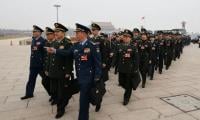Cross-border attacks
A latest report by UN experts has highlighted that Al Qaeda’s past ties to the Afghan Taliban have the potential of making Afghanistan a safe haven for extremists. The report to the UN Security Council by the panel of experts monitoring sanctions against Al Qaeda and IS – circulated on Feb 7 – says that some terrorists groups are now enjoying greater freedom in Afghanistan than at any other time in recent history. The report is wide-ranging and should be taken seriously as it is not from Nato or the US that occupied Afghanistan for twenty years. If extremists linked to both Al Qaeda and the militant Islamic State are operating in Afghanistan, this does not spell an auspicious future for peace in this region. We have seen in the past couple of weeks various terrorist attacks in Pakistan whose links are said to be based across the western borders of the country. On February 6, five Pakistan soldiers lost their lives after terrorists inside Afghanistan opened fire on troops in Khyber Pakhtunkhwa’s Kurram district. The use of Afghan soil by terrorists for activities against Pakistan is highly condemnable and it is time the Afghan government looked into this seriously.
If the TTP are able to further cement their foothold in this region, the prospects of peace will be doomed – and will quite contrary to what we have been led to believe. This region has remained turbulent for over 40 years now, and after the Taliban takeover in Kabul in August 2021, we were informed that now all will live happily ever after. The Afghan Taliban were supposed to take care of all terrorist groups in Afghanistan and we hoped they would not allow the use of their soil for terrorism. Then after six months it dawned on us that terrorist groups are still operating from across the border. The TTP has been leading an insurgency in Pakistan for at least 15 years, and Pakistan has conducted numerous operations to root them out. The government of Pakistan had seemingly expected that once the Afghan Taliban were in full control of Afghanistan, the problem of terrorism would be eliminated. But it seems that the TTP is making significant gains in Pakistan too by staging repeated attacks at will. Alarmingly, their operational capability does not seem to have diminished in any way.
Moreover, the UN report says that “there are no recent signs that the Taliban have taken steps to limit the activities” of terrorist fighters in the country. This is a disturbing situation; if terrorist groups are enjoying freedom in Afghanistan – under whatever pretext – its immediate fallout reaches Pakistan. Since the Afghan Taliban are making efforts to gain legitimacy and international recognition, they must fulfill their promises to root out safe havens of terrorists in their country. A continued ability of terrorist groups to mount attacks in Pakistan should be a major cause of concern for the Afghan Taliban too, as Pakistan has been their vocal supporter on international forums and has repeatedly asked the world community to offer humanitarian aid to Afghanistan. The security situation in the region is becoming more complex by the day and is also a diplomatic nightmare that needs swift solution before further damage is done and lives lost.
-
 Sydney Sweeney Falsely Linked To Ottawa Senators' Brady Tkachuk
Sydney Sweeney Falsely Linked To Ottawa Senators' Brady Tkachuk -
 Astronaut Ron Garan Reveals Earth’s ‘Big Lie’ Discovered From Orbit
Astronaut Ron Garan Reveals Earth’s ‘Big Lie’ Discovered From Orbit -
 Meghan Markle And Prince Harry's Netflix Deal Is 'under Pressure': Here's Why
Meghan Markle And Prince Harry's Netflix Deal Is 'under Pressure': Here's Why -
 How Did Lou Holtz Die?
How Did Lou Holtz Die? -
 China Raises Defence Spending 7% As Modernisation Drive Intensifies By 2035
China Raises Defence Spending 7% As Modernisation Drive Intensifies By 2035 -
 Real Reason Why Bethenny Frankel Refused To Join 'Real Housewives' Reboot Series
Real Reason Why Bethenny Frankel Refused To Join 'Real Housewives' Reboot Series -
 Is Gen Z Becoming The Most Conservative Generation? ‘Progressive Paradox’ Explained
Is Gen Z Becoming The Most Conservative Generation? ‘Progressive Paradox’ Explained -
 Lindsay Lohan's 'scary' Decision Amid War Worries Her Inner Circle
Lindsay Lohan's 'scary' Decision Amid War Worries Her Inner Circle -
 Nebraska Sues Roblox Over Child Safety Failures
Nebraska Sues Roblox Over Child Safety Failures -
 Amanda Holden Finds The Bright Side With Nostalgic Move Amid ‘Britain’s Got Talent’ Crisis Rumors
Amanda Holden Finds The Bright Side With Nostalgic Move Amid ‘Britain’s Got Talent’ Crisis Rumors -
 Strait Of Hormuz Turmoil: Gulf Shipping Crisis Raises Fears Of Global Food Price Shock
Strait Of Hormuz Turmoil: Gulf Shipping Crisis Raises Fears Of Global Food Price Shock -
 Sarah J Maas Makes Exciting Announcement For ‘Acotar’ Series
Sarah J Maas Makes Exciting Announcement For ‘Acotar’ Series -
 Teyana Taylor Makes Shocking Claim About 'One Battle After Another': 'Very, Very Real'
Teyana Taylor Makes Shocking Claim About 'One Battle After Another': 'Very, Very Real' -
 Qatar Airways To Operate Relief Flights From Muscat And Riyadh For Stranded Travelers Amid Global Turmoil
Qatar Airways To Operate Relief Flights From Muscat And Riyadh For Stranded Travelers Amid Global Turmoil -
 2026 Pro-Human AI Declaration: How Humanity Can Control Artificial Intelligence
2026 Pro-Human AI Declaration: How Humanity Can Control Artificial Intelligence -
 Lewis Hamilton Vows To 'put More Work In' As He Gears To Return For 2026 Formula 1 Season
Lewis Hamilton Vows To 'put More Work In' As He Gears To Return For 2026 Formula 1 Season



